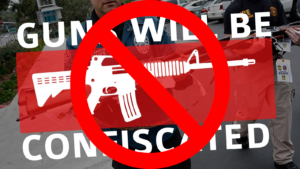
It is ILLEGAL for anyone, including law enforcement, to confiscate legal firearms and ammunition during a declared state of emergency or local emergency.
See Federal Emergency Powers Here.
State Cannot Impose New Restrictions
During a declared state of emergency or local emergency, neither the governor nor an agency of a governmental entity or political subdivision of the state may impose restrictions, which were not in force before the declared state of emergency, on the lawful possession, transfer, sale, transport, storage, display, or use of a firearm or ammunition; and an individual, while acting or purporting to act on behalf of the state or a political subdivision of the state, may not confiscate a privately owned firearm of another individual.
If Your Firearms Are Confiscated, You Can Sue
An individual who has a firearm confiscated in violation, may bring a civil action in a court having the appropriate jurisdiction for damages, in the maximum amount of $10,000 against a person who violated, for a civil penalty in the amount of $5,000 per violation against a person who violated, and for return of the confiscated firearm.
If a law enforcement officer commits a violation, the officer’s liability is limited to 5% of the damages and civil penalty, if the officer can show by clear and convincing evidence that the officer was obeying a direct and unlawful order from a superior officer or authority. The court shall assess the balance of the damages and civil penalty, the remaining 95%, against the superior officer or authority who ordered or directed the confiscation in violation of law.
Law Enforcement Protected For Refusing To Confiscate
A law enforcement officer is not subject to disciplinary action for refusing to confiscate a firearm under this section if ordered or directed to do so by a superior officer and by obeying the order or direction, the law enforcement officer would be committing a violation of law.
Laws
53-2a-204. Authority of governor — Federal assistance — Fraud or willful misstatement in application for financial assistance — Penalty.
(1) In addition to any other authorities conferred upon the governor, if the governor issues an executive order declaring a state of emergency, the governor may:
(e) in connection with evacuation, suspend or limit the sale, dispensing, or transportation of alcoholic beverages, explosives, and combustibles, not to include the lawful bearing of arms;
53-2a-214. Prohibition of restrictions on and confiscation of a firearm or ammunition during an emergency.
(1) As used in this section:
(a)(i) “Confiscate” means for an individual in Utah to intentionally deprive another of a privately owned firearm.
(ii) “Confiscate” does not include the taking of a firearm from an individual:
(A) in self-defense;
(B) possessing a firearm while the individual is committing a felony or misdemeanor; or
(C) who may not, under state or federal law, possess the firearm.
(b) “Firearm” has the same meaning as defined in Section 76-10-501.
(2) During a declared state of emergency or local emergency under this part:
(a) neither the governor nor an agency of a governmental entity or political subdivision of the state may impose restrictions, which were not in force before the declared state of emergency, on the lawful possession, transfer, sale, transport, storage, display, or use of a firearm or ammunition; and
(b) an individual, while acting or purporting to act on behalf of the state or a political subdivision of the state, may not confiscate a privately owned firearm of another individual.
(3) A law or regulation passed during a declared state of emergency that does not relate specifically to the lawful possession or use of a firearm and that has attached criminal penalties may not be used to justify the confiscation of a firearm from an individual acting in defense of self, property, or others when on:
(a) the individual’s private property; or
(b) the private property of another as an invitee.
(4)(a) An individual who has a firearm confiscated in violation of Subsection (2) may bring a civil action in a court having the appropriate jurisdiction:
(i) for damages, in the maximum amount of $10,000, against a person who violates Subsection (2);
(ii) for a civil penalty, in the amount of $5,000 per violation, against a person who violates Subsection (2); and
(iii) for return of the confiscated firearm.
(b) As used in this Subsection (4), “person” means an individual, the governmental entity on whose behalf the individual is acting or purporting to act, or both the individual and the governmental entity.
(5)(a) A law enforcement officer is not subject to disciplinary action for refusing to confiscate a firearm under this section if:
(i) ordered or directed to do so by a superior officer; and
(ii) by obeying the order or direction, the law enforcement officer would be committing a violation of this section.
(b) For purposes of this Subsection (5), disciplinary action might include:
(i) dismissal, suspension, or demotion;
(ii) loss of or decrease in benefits, pay, privileges or conditions of employment; and
(iii) any type of written or electronic indication, permanent or temporary, on the officer’s personnel record of the officer’s refusal to obey the unlawful order.
(6)(a) If a law enforcement officer commits a violation of this section, the officer’s liability in an action brought under Subsection (4)(a) is limited to 5% of the damages and civil penalty allowed under Subsection (4)(a) if the officer can show by clear and convincing evidence that the officer was obeying a direct and unlawful order from a superior officer or authority.
(b) The court shall assess the balance of the damages and civil penalty, the remaining 95%, against the superior officer or authority who ordered or directed the confiscation in violation of this section.
